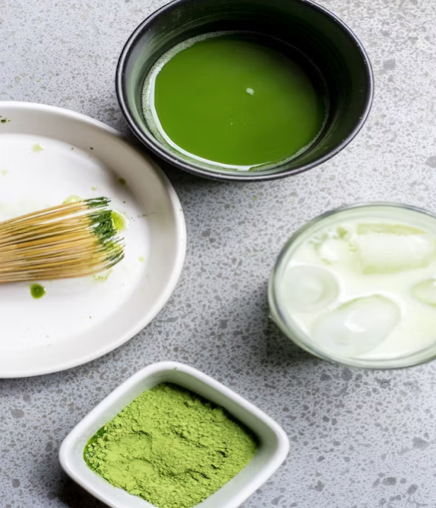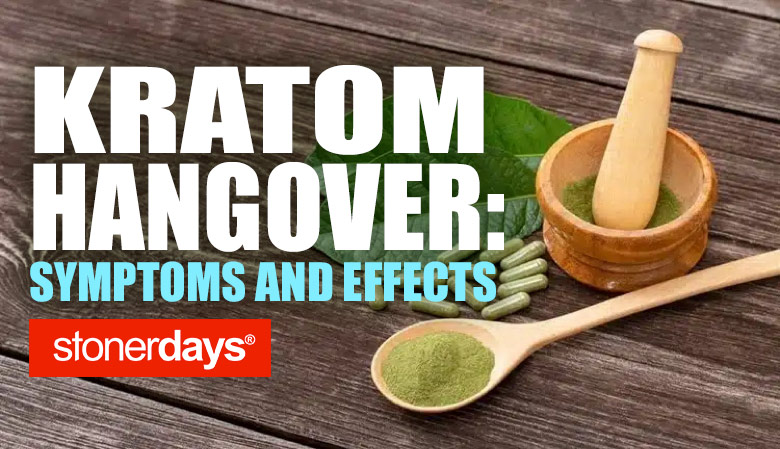There are many things that people using kratom may find difficult to treat or control, Kratom hangover symptoms and effects included.
Now that we have a brief idea of what kratom is and an overview of the reasons for a kratom hangover, let’s go deeper into the topic. We’ll cover symptoms like headaches, which are manifest in 40-60% of patients, nausea, dry mouth, fatigue, and joint and muscle aches.
Further, we will share some guidelines on practical recovery, namely, drinking, exercising, sleeping, using pills, medication, other over-the-counter medication, and relaxation. We also look at factors contributing to kratom hangovers, such as taking high kratom doses, using substandard kratom, taking kratom when you are not tolerant, being sensitive to kratom, and using kratom in combination with other drugs. In addition, there is a difference between kratom hangover and kratom withdrawal.

Finally, we will provide information about how to prevent the reactivation of a kratom hangover and the duration of this phenomenon.
What is Kratom?
Kratom, also known as Mitragyna speciosa, is a tropical tree that belongs to the Rubiaceae family that exists in Southeast Asia countries, including Thailand, Malaysia, and Indonesia. Kratom is derived from the leaves of a tree and has natural psychoactive effects, and is mostly used for the treatment of sickness.
These natural alkaloid containing leaves can be used in raw form, dried for use in teas, or ground into powder form and can be used in order to give the stimulant or sedative effect depending on the dosage and variety used.
The most effective alkaloids in kratom consist of mitragynine and 7-hydroxymitragynine, which act on the opioid receptors in the CNS and offer similar features of an opioid and a stimulant. In smaller doses, the averting properties of kratom are indicative of a stimulant as it can boost vitality, attentiveness, and friendliness. At higher doses, there are sedative effects and good pain relief, which can cause confusion and feelings of happiness.
Third, it has been in the recent past used as a natural remedy for anxiety, depression, pain, and even as a withdrawal symptom from opiate use. However, it is not yet safe and reliable as many researchers are still working on its positive effects rather than its downsides; it has faced legal issues in several countries and states in the United States of America because of its negative impacts, such as dependency and health complications.

Of course, as with anything, one can better understand kratom by learning about its benefits, the dangers of its use, and how to use it appropriately. For quality kratom products, consider where to buy Happy Go Leafy’s kratom.
Symptoms of Kratom Hangover
Headache:
The most apparent indication of a kratom hangover is always that you will have a throbbing headache. This can range from a mild pain that is felt as a pins and needles sensation to a throbbing pain.
Nausea:
The effects of nausea are also felt by most people, especially after consuming kratom. The two are distinguished in that they can cause certain nausea and even an overwhelming desire to vomit.
Dry Mouth:
Dry mouth, or xerostomia, is another usual symptom associated with a kratom hangover. It can make one feel dry and Thirsty.
Fatigue:
Getting tired and lazy are some of the after-effects that are found to be associated with kratom once its effects are worn out.
Aches and Pains:
Some users may also feel body aches and pains; this may be because of quitting kratom use.
These symptoms can range from mild to severe and depend on some of these factors, including the amount of kratom used, the reception level of the user, and the type of kratom used. These symptoms can be eased through regular intake of water and getting enough sleep; however, if the abnormality is severe, it will require consulting a doctor. Recognizing the signs of a hangover effect that comes from abusing the kratom drug helps enable users to manage the issue and avoid its discomforts.
How To Recover From Kratom Hangovers?
Recovering from a kratom hangover can be aided by several strategies:
Hydrate:
Drinking a lot of water must be of paramount importance so as to wash off your body after going through a kratom hangover. He should drink lots of water so that you are not thirsty and complains of sore throat and fatigue, which are likely to be caused by dry mouth.
Exercise:
A walk might elongate the blood vessels and bring new blood to my head, and sunshine can always improve my mood. However, it is advisable to avoid intense exercises as they might contribute to fatigue.
Sleep:
To eliminate all the impacts of kratom, regression is required, and rest is crucial for this objective. Sleeping 7-9 hours without interruptions is necessary to let the body recover after work and various activities.
Over-the-Counter Medications:
Kratom users should consider taking over-the-counter pain and inflammation medication, such as Ibuprofen or Acetaminophen, for headaches or muscle pains that the kratom hangover may cause. Nevertheless, food that contains cholesterol should be taken as recommended, with the consumer avoiding eating too much of it.
Relax:
Do what you feel is enjoyable or use leisure, as some people call it. One should engage in relaxation techniques such as deep breathing, meditation, or a warm bath to reduce the intensity of the pain and create a relaxing environment.
These recovery processes may assist you in minimizing the effects of a kratom hangover and increase your well-being. Symptoms are rarely severe, but when they do not subside or if they become worse, an individual should consult his or her physician.
What Are the Causes of Kratom Hangovers?
Excessive Dosage:
However, taking large doses of kratom is followed by a hangover effect whereby the consumers may experience certain after-effects. Food and Drug Administration advises that overuse of kratom leads to an accumulation of its chemical in the body that results in various withdrawal symptoms like fatigue, nausea, and headaches, which are similar to a classic junk hangover.
Low-Quality Kratom:
Again, it is imperative to state that the quality of the kratom that is consumed can greatly determine if one will experience a kratom hangover or not, including the severity of the symptoms. Accurate and precise kratom dosing may cause a number of different side effects, but lower-quality kratom may have other impurities that make these sides more probable and more expressed.
Lack of Tolerance:
There is a fact that people who are using kratom for the first time in their personal experiences, or those who still have not developed tolerance to it, are more likely to suffer from such a ‘hangover’. The human body requires some time to acclimatize itself to the alkaloids consumed when using kratom, and this is why hangovers seem very frequent in the process.
Individual Sensitivity:
There are always going to be distinct differences in how people’s body metabolizes substances, and kratom is not immune to this rule. Some people feel physically/mentally affected from even moderate use of kratom due to sensitivity to alkaloids present in it, and thus, they are likely to develop hangovers.
Mixing with Other Substances:
However, you should not take any other substance together with your kratom because it will enhance its impact and prolong the hangover period, besides possibly reacting negatively with alcohol or specific medications. Experiencing kratom alongside the use of other drugs can exert pressure on the body and possibly worsen the side effects.
What Are the Difference Between kratom hangover and withdrawal?
Kratom Hangover:
Causes:
Acute effects of kratom cause these kinds of side effects and must lead to hangovers. They can be, in some cases, induced as a result of wrong dosages or use of low-grade kratom, or I think some people are just highly sensitive to the herb.
Symptoms:
Headaches
Nausea
Fatigue
Dehydration
Dizziness
Irritability
Duration:
Most kratom hangovers are mild and do not last more than 24 hours, but this will depend on the body tolerance of an individual as well as the dose administered. This is due to the rather slow elimination of the symptoms as the body breaks down the present alkaloids in kratom.
Management:
Hydration: One should ensure they take enough water or any other fluids to solve the cases of dehydration and reduce headaches and fatigue.
Rest: Sufficient rest may also help with healing and reducing the exhaustion or tiredness that one experiences.
Moderate Consumption: However, reducing kratom dosage consumption or moderating the use of kratom will help in reducing or eradicating hangover fully.
Kratom Withdrawal:
Causes:
Kratom withdrawal is defined as a state that occurs when a person has developed kratom dependence and subsequently reduces kratom use substantially. This is a compensation mechanism within the body due to the withdrawal effects after cessation of the kratom’s alkaloids.
Symptoms:
Anxiety
Irritability
Insomnia
Muscle aches
Sweating
Nausea and vomiting
Duration:
The symptoms of Mitragyna Speciosa dependence might take several days to several weeks or even longer, depending on the usage, dosage level, and personal health of the user.
Management:
Tapering: A gradual dose-tapering plan is also beneficial in an attempt to reduce the withdrawal symptoms associated with kratom use effectively.
Support: It might be helpful for the individual to talk to a doctor or seek help from other people and support groups on how to minimize the withdrawal process.
Healthy Lifestyle: This can involve exercising, eating properly, and sleeping well, while other activities such as yoga, meditation, and acupuncture can enhance the withdrawal process.
Able to recognize these differences, it becomes easier to determine if one is suffering from a kratom hangover or struggling with withdrawal symptoms. Therefore, users can then develop measures to handle such issues. For dependence or withdrawal to become a problem, involving a professional is recommended.
How to Avoid Kratom Hangover?
Kratom hangover prevention measures are performed to make use of the herb safer and more pleasant to the body by applying the following principles. By following these guidelines, users can minimize the risk of experiencing unpleasant hangover symptoms:
Hydration:
This is primarily to avoid dehydration, which is often associated with hangovers, more so if the kratom is taken alongside other substances. Drinking water reduces the degree of the general ‘post-Kratom’ flu symptoms such as headaches, body weakness, and dizziness. One must consider hydrating the body adequately and try to take the equivalent of at least eight glasses of water daily while using kratom.
Avoid Alcohol:
Consuming kratom for any purpose with alcohol raises the risk of having a kratom hangover due to the amplification of the substance’s effects. Alcohol is a diuretic, meaning it causes frequent urination, while kratom also contributes to dehydration, making consumption of both risky during summer.
Watch Your Dose:
To avoid hangovers, it is important that kratom consumers maintain a check on their quantity of intake. Consuming kratom in large doses for a long time can also stress the body, and the user will experience withdrawal symptoms that are similar to the use of other opiate substances such as shots, nausea, headache, and constant fatigue, among others. Also, avoid increasing the dose beyond the initial recommended amount before realizing the effect that comes with it and that which you desire.
Healthy Diet:
Thus, the intake of wholesome meals that may include proteins, vegetables, and other major nutrient foods should be a top priority in boosting metabolism and averting hangover-like symptoms of kratom. A well-balanced diet that includes Vitamins, Minerals, and antioxidants can ensure general health, reducing the risks of having negative side effects of kratom. Avoiding heavy and greasy foods such as burgers, fries, fried chicken, chicken nuggets, bacon, and other foods similar to those categories before or after taking kratom reduces the chances of having stomach upsets and complications.
Avoid Sedative Strains:
While some kratom strains contain elements that can induce feelings of relaxation and calmness, these combined with risky intake, can cause the user to experience a hangover effect. To decrease the likelihood of getting a kratom hangover, it is important to avert specific sedative strains and, in general, use large dosages. But, there are better and more interesting ones that are far from bringing some sleepy sensation into your feeling.
How Long Does Kratom Hangover Last?
How long it takes for a kratom hangover to last is also dependent on the following factors: the amount that one has ingested, his or her tolerance level, and the general health of the user. A kratom hangover can occur, but as compared to other hangovers, it is reportedly brief and can last for a couple of hours up to a day or so.
A combination of minor symptoms is usually seen after the use of a moderate dose of kratom, although some symptoms can last only for a short time before going away. In cases where the symptoms are severe, the hangover effects may begin to wear off a few hours after the initial onset.
If one took a big amount of kratom or is experiencing a new batch, then, or one of those sensitive to its impact, yes, the infamous kratom hangover could be intensely felt. In such cases, the symptoms could have lasted for hours, equivalent to a day, before finally losing intensity.
There are records of prolonged hangovers and related adverse effects of using kratom when it is consumed in large quantities or mixed with other substances. In such a case, the film’s representations of the hangover’real’ in terms of the symptoms could last for the entire day or even more before the body completely recovers.
However, although its length might also depend on a number of factors, most people have noted that the duration of kratom hangovers does not take too long compared to the hangovers from other substances.
To further combat kratom hangovers, proper diet and nutrition, sleep, and physical fitness should be observed. In case the signs and symptoms develop or increase, it is necessary to turn to a doctor for help.
Conclusion
Important information needs to be gathered when it comes to experiencing kratom hangovers. To prevent working while sick, one must be able to identify signs such as head-racking pains, queasiness, and feeling drained. These include the intake of water, participation in some forms of physical activity, avoiding work and other such tasks, and the use of drugs that are available over the counter.
Possible causes of hangovers include the use of high doses of kratom, the use of low-quality kratom, high tolerance levels or low tolerance, and other substances. It is thus important to differentiate between alcoholic hangovers and withdrawal symptoms or both. To avoid such episodes, one should drink water frequently, avoid alcohol, check the dosage, eat a balanced diet, and avoid sedative cannabis.
Kratom hangovers typically last from a few hours to a day, shorter than other types. Embracing a healthy lifestyle further mitigates their effects. Seeking medical advice is important if symptoms persist. For more information, visit reputable sources and brands.
Frequently Asked Questions
How can I prevent a Kratom hangover?
You should avoid taking high doses of the drug, combine it with other substances, consume ancient organic Kratom only, and drink lots of water.
Are there any long-term effects of Kratom hangovers?
Regarding one’s ability to have limited or no Kratom hangover, in the long run, is scarce. Nevertheless, potential consequences of its long-term abuse include dependency as well as a range of undesirable outcomes for one’s health.
Is it safe to use kratom?
Even though some individuals take the drug for medical purposes, the subject remains up for controversy. It can create dependency and certain health problems, thus it should be used with care.
Can I take kratom on an empty stomach?
An overdose of kratom and other severe reactions linked to the substance is most likely to be felt when it is ingested on an empty stomach. Yet, it can also lead the subject to obtain the feeling of nausea and discomfort.
Is it possible to ease Kratom hangovers with calming exercises?
The following activities may help to treat the symptoms of a Kratom hangover: Drinking water, taking a nap, having a warm bath, practicing deep breathing, or meditation.


